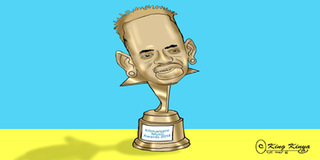Bravo Kili Awards stars, but where’s our music?

What you need to know:
We had been blessed with great musicians such as Salum Abdallah, Ahmed Kipande, Marijani Rajabu and Muhidini Mwalimu “Gurumo” who, until his death last month, was Tanzania’s living legend of dance music.
After months of media blitz and electronic voting, winners of the Kilimanjaro Music Awards became known on Friday, May 2. We congratulate, first, the winners for their victories and second, the Tanzania Breweries Ltd which has single-handedly made the event possible over the past 13 years.
The event gives us a reason to reflect on Tanzania’s music scene, which, one might say, is awash with good music. From as early as the 1960s, Tanzania was viewed as home of greatest music in the East African Community bloc.
We had been blessed with great musicians such as Salum Abdallah, Ahmed Kipande, Marijani Rajabu and Muhidini Mwalimu “Gurumo” who, until his death last month, was Tanzania’s living legend of dance music.
Music is a universal language, which explains why the Waswahili who don’t know a word in Kilingala, enjoy without limit music from Congo. Music is about the beat; it is about the rhythm and the melody – and the dance. It is about a people and their unspoken culture. You hear Kwaito or Kwela and you know that is South African.
You hear the rhumba – that is Congolese. You hear Juju and that is Nigerian, while Makosa is from Cameroon, the land of Manu Dibango. Our neighbours to the north, Kenya, have Benga.
Tanzania has artistes with a wonderful gift of voices and instrumentalists. Yes; very many. But what is their winning beat? Do we visualise our most decorated new generation musicians getting an invite to perform in South Africa, Nigeria and Guinea?
The sad fact is: music performed by our local artistes today purports to be Tanzanian mainly because our artistes sing in Kiswahili, our national language. That is, as they say, no big deal!
Some of our musicians have even abandoned their Tanzanian names; they have adopted strange, alien names; names “that sell.” Where is our national pride?




